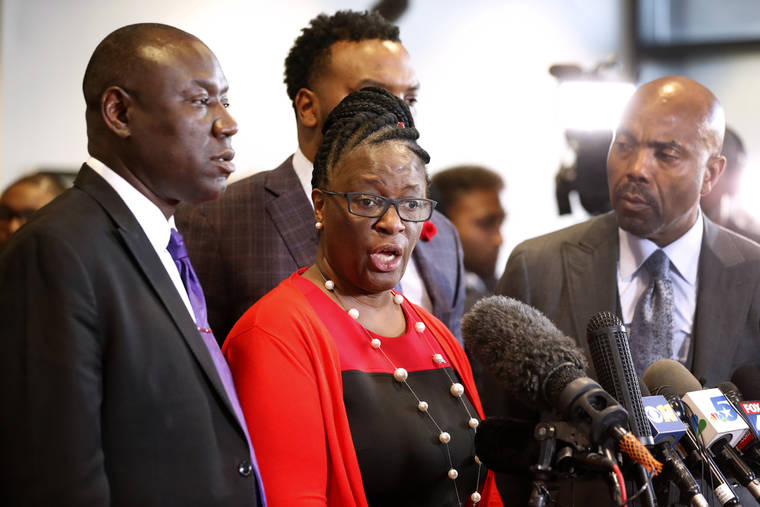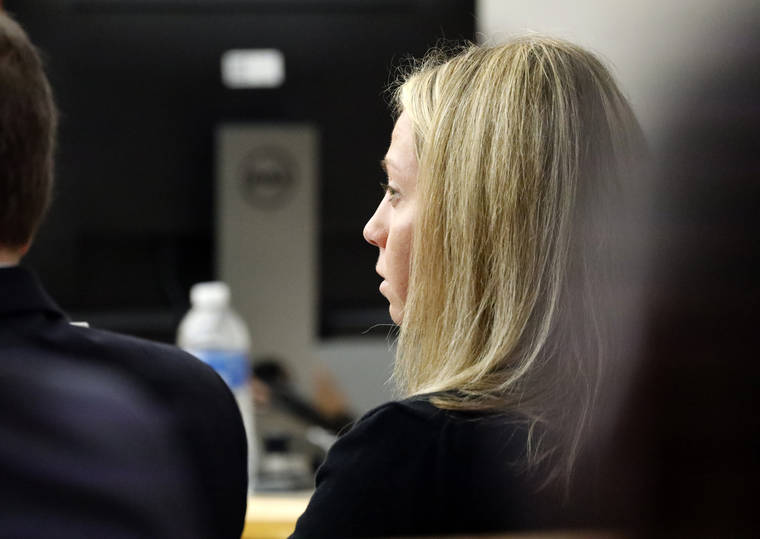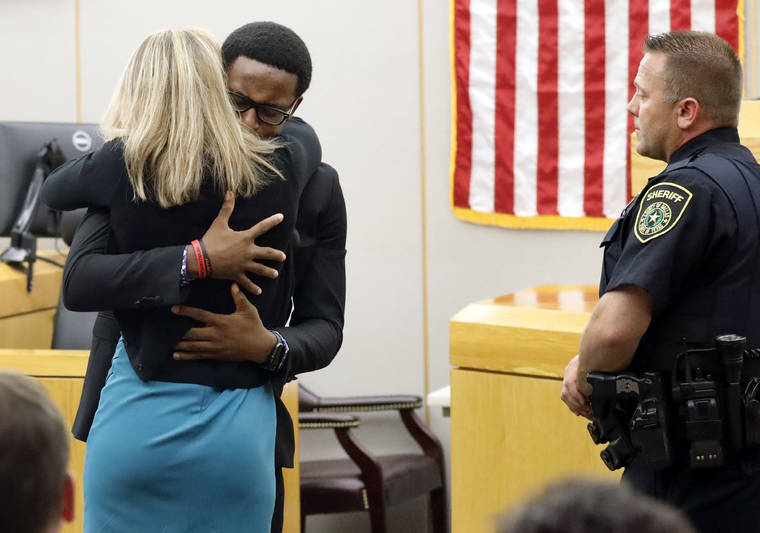DALLAS — The brother of a black man who was shot dead by a white Dallas police officer who said she mistook the victim’s apartment for her own forgave and embraced her Wednesday as she sobbed after being sentenced to a decade in prison.
As people outside of the courtroom reacted angrily to the 10-year sentence given to Amber Guyger for killing Botham Jean in his apartment, believing it was too lenient, his brother was allowed to address her directly from the witness stand.
Brandt Jean told Guyger that he thinks his brother would have wanted her to turn her life over to Christ, and that if she can ask God for forgiveness, she will get it.
“I love you as a person. I don’t wish anything bad on you,” he said to the 31-year-old Guyger, before adding, “I don’t know if this is possible, but can I give her a hug?”
The judge said he could, and Brandt and Guyger stood up, met in front of the bench and embraced while Guyger cried.
Jurors could have sentenced the former officer to up to life in prison or as little as two years, but prosecutors asked them to send her to prison for 28 years, which is how old Botham Jean would have been if he was still alive.
The 10-year sentence, which will make Guyger eligible for parole after five years, was met with boos and jeers by the crowd outside of the packed courtroom, with one woman saying, “It’s a slap in the face.”
Speaking to reporters after the hearing, Jean’s mother, Allison Jean, criticized the investigation into her son’s death, saying “the corruption that we saw during this process must stop” and that it’s up to the people of Dallas to bring about change.
She also criticized Guyger and the police training to shoot to kill.
“If Amber Guyger was trained not to shoot in the heart, my son would be alive today. He was no threat to her. He had no reason to be a threat to her, because he was in his own apartment,” Allison Jean said.
Dallas County District Attorney John Creuzot, a former trial judge, called Brandt Jean’s embrace of Guyger was an “an amazing act of healing and forgiveness that is rare in today’s society … especially for many of our leaders.”
“If your 18-year-old brother can heal and express healing in that fashion, in his words and in his deeds, I would hope that the greater community, not just Dallas but all of Texas and all of the United States, could gain a message from that,” he told reporters.
Dallas’ mayor, Eric Johnson, issued a statement saying he, too, was “deeply moved” by Brandt Jean’s actions: “I will never, ever forget the incredible examples of love, faith and strength personified by Botham, Brandt and the entire Jean family.”
Mike Mata, who heads the Dallas Police Association, didn’t immediately reply to a request for comment.
The basic facts of the unusual shooting were not in dispute throughout the trial. Guyger, returning from a long shift that September 2018 night, entered Jean’s fourth-floor apartment and shot him. He had been eating a bowl of ice cream before she fired.
Guyger said she parked on the wrong floor and mistook Jean’s apartment for her own, which was directly below his, and mistook him for a burglar. In the frantic 911 call played repeatedly during the trial, Guyger said “I thought it was my apartment” nearly 20 times. Her lawyers argued that the identical physical appearance of the apartment complex from floor to floor frequently led to tenants going to the wrong apartments.
But prosecutors questioned how Guyger could have missed numerous signs that she was in the wrong place. They also asked why she didn’t call for backup instead of walking into the apartment if she thought she was being burglarized and suggested she was distracted by sexually explicit phone messages she had been exchanging with her police partner, who was also her lover.
The shooting drew widespread attention because of the strange circumstances and because it was one in a string of shootings of unarmed black men by white police officers.
One of the Jean family lawyers hailed the verdict as “a victory for black people in America” after it was handed down Tuesday.
The jury was largely made up of women and people of color.
———
Associated Press video journalist John Mone and writer Jamie Stengle in Dallas, and writer Jill Bleed in Little Rock, Arkansas, contributed this this report.
———
Follow Jake Bleiberg on Twitter: https://twitter.com/jzbleiberg




